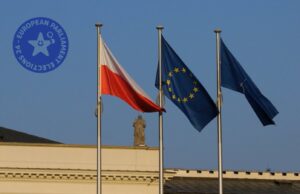Will the Greens in Luxembourg maintain their seat in the European Parliament or yield it to right-wing populists? Such a potential loss could bolster the ECR (European Conservatives and Reformists). Can progressive parties, including socialists, greens, or left-leaning factions, effectively prioritise social and environmental concerns? Meanwhile, the conservative-liberal government appears to be emphasising security policies, potentially aligning with the rhetoric of right-wing populists.
The current state of party politics
Luxembourg is allocated 6 seats in the EU Parliament. Even minor shifts in election outcomes can determine the acquisition or loss of mandates. However, the likelihood is that there will be only a minimal change in party proportions. The pivotal question in the upcoming elections revolves around whether the Greens can retain their mandate or if the Parliament will shift to the far right.
In September 2023, there were parliamentary elections in which the Greens, a member of the governmental coalition, lost 40% of their votes, and thus 5 of their 9 seats. Likewise, déi Lénk (a member of the European Left Party), a party of the opposition, must count themselves among the losers with the loss of 25% of their votes compared to the parliamentary elections in 2018, even if they were able to defend their two mandates (of 60 total deputies in the parliament). The votes lost by the Greens and the Left were divided among the 5 other parties represented in Parliament, so that one cannot speak of the electoral success of a single party. There was rather a shift to the right from which all parties on the right spectrum were able to benefit. As a result, the Christian Social People’s Party and the Liberal Party agreed on a coalition, which has pursued a policy of social hardship since taking over government six months ago. Alleged questions of security were quickly placed at the centre of the new government policy and linked to migration issues. After just a few weeks in office, a campaign of repression began against “professional gangs of beggars” (who according to unproven statements from the government attempting to suggest mafia involvement, were brought to the country in luxury cars), as well as “dealers” and drug users, who were strongly linked to migration issues in government discourse.
Real social challenges, such as dealing with the climate crisis or the housing shortage, have so far not been answered at all or have been answered with liberal approaches. To solve the climate crisis, the government relies on technological solutions, and emphasises that there is still time to deal with it and that it should therefore prioritise other issues. In this context, new-type nuclear power plants are being praised. A half-hearted incentive policy is intended to inspire electric mobility in private transport, but at the same time the decision to end the sale of combustion engines is being questioned. Likewise, burning social issues will be entrusted to the market: housing construction will be stimulated through tax advantages for investors and owners. These advantages have not had the desired results over the past 20 years and are unlikely to increase access to affordable housing in the future, but rather will increase investor profit margins.
It seems as if pension reform is supposed to be this government’s great issue. The government has already set the direction: the statutory old-age pension should be weakened to strengthen private supplementary insurance, a measure that is intended to pour money into the weakening financial sector.
It is not yet clear whether this economically liberal and conservative-authoritarian course of the two governing parties will also have an impact on a new partnership with the right-wing populists, but there is an increasing number of banalising and welcoming words from members of the government for the ADR, Luxembourg’s increasingly reactionary, right-wing populist party. (In 2023 the ADR got 9.27%, this was an increase of + 0.99% compared to the previous parliamentary elections. In the last European elections, it got 10.03% and was therefore 6,000 individual votes away from a mandate. The ADR joined the ECR (the Conservatives and Reformists).
At the European level, the new government, like its predecessors, will defend Luxembourg as a tax haven with all the means at its disposal. This attitude determines all other policy areas. Luxembourg has always been prepared to make any compromises with any partner if this is in the interests of the financial sector. However, the politics as it is shaped in the corridors of the Berlaymont seem far away from the real life of people living in Luxembourg. The voting behaviour of MPs is rarely discussed publicly.
Lines of conflict
According to a recent survey, the cost explosion on the housing market is the all-important political issue for all age groups, educational levels, and party preference. In addition, people are worried about the gap between rich and poor, the increase in car traffic, as well as inflation, especially the increase in energy costs. The perception of right-wing extremism as a danger has increased significantly in recent months (to 46%, + 12%).
The government’s measures to combat poverty are rejected as anti-social by most respondents (53%), but at least 46% (against 51%) agree with the ban on begging. This indicates a deep division in society. The discussion on pension reform is still in its early stages. 75% of those surveyed would like private supplementary insurance to be strengthened (by tax relief for contributors). But abolishing the cap on pension contributions to finance possible contribution bottlenecks – a measure that déi Lénk has brought into the discussion – is also supported by around the same number of people. There is a need for clarification to the extent that these two measures are mutually exclusive. The fact that the government’s messaging is bearing fruit can also be seen here: for 45% of Luxembourg’s residents, the pension system is not viable. This fear does not correspond to reality at all, considering that the reserves of the state pension funds alone could finance pensions for almost 5 years. Even without reform, the Luxembourg pension system is covered by its reserves until 2041.
In 2023, a significant portion of Luxembourgers perceived their economic situation as ‘increasingly dire’, marking a 30% surge compared to 2018. Additionally, a prevailing belief emerged among Luxembourgers regarding a bleaker economic outlook for the future. Interestingly, in 2023, a slight majority of respondents favoured economic growth over environmental protection, marking a departure from prior survey trends. This shift likely contributed to the Greens’ disappointing electoral performance.
Non-Luxembourgers
In 2015, 4 out of 5 Luxembourgers voted against allowing foreigners to vote. The exclusion of people without a Luxembourg passport from parliamentary elections weakens the legitimacy of the parliament in a country where less than half of the population has such a passport. If you add the many cross-border commuters working in Luxembourg, those eligible to vote become an even smaller minority of the population. When it comes to decisions about labour law or social security, only a third of those affected have a right of co-determination. Even today, 48% (against 38%) of Luxembourgers still oppose voting rights for foreigners at the national level. However, 68% (against 21%) of foreigners want to be able to take part in all elections in Luxembourg. Most foreigners also want to be represented in the parliaments of their home country, but this number is dwindling (+ 10% are unsure which of the parliaments they would most like to vote for).
“Should Luxembourgers receive priority over foreigners in employment?”: This question provides insight into the broader perspective of xenophobic sentiments among many Luxembourgers. While there has been a 3% decrease compared to 2018 and a 23% decrease compared to 2013 in favour of privileging Luxembourgers, a majority of 53% (compared to 40%) still support nationality being a determining factor in hiring decisions. Interestingly, the xenophobic attitudes of Luxembourgers appear to have minimal influence on the voting behaviour of foreigners. Similarly to those with Luxembourg citizenship, a majority of foreigners tend to lean towards the right of centre in their voting preferences. déi Lénk consistently mobilises to encourage many immigrants from EU countries to register on voter lists for elections in Luxembourg. The party believes that many of these individuals would be attracted to the Left’s radically inclusive agenda.
For a fair, solidarity-based, ecological and democratic Europe
déi Lénk would like to appeal to young voters in the 2024 European elections with young candidates (with an average age of 31). Age itself should not be the issue, but rather the situation of young people as renters or employees. Young people are increasingly finding out that politicians today are not offering them solutions to the many crises that determine their present and future. In Luxembourg, as elsewhere, the interests of the few continue to be put above the needs of the many.
To address this age group, déi Lénk relies on positive communication: a better EU should contribute to a better future. The party’s election programme contains elements of a solidarity-based alternative to the current situation. From poverty to unemployment and homelessness, from political repression to war, from environmental and climate crises to racist isolation and camp systems at the deadly EU external borders: the capitalist law of value, with its imperative of maximum profit for those who own the means of production, determines all areas of life. However, this can be countered with social and tax justice, with a social-ecological transition, with open borders, with a humane reception of refugees and with a democratic project for the EU. This should primarily be communicated via social networks. In accordance with Marx’s and Engels’s approach, we want to keep moving toward abolishing the current situation. The left-wing elitist ivory tower approach should be overcome. The motto of déi Lénk is: zesummen stoen, stand together, faire bloc.
The political competitors have strangely formed their mottoes around strength: fir a staark Lëtzebuerg an Europ” (a strong Luxembourg in Europe, right-wing populists), Europa brauch e staarkt Häerz (Europe needs a strong heart – Social Democrats), fir eng staark Stëmm an Europa (a strong voice in Europe – conservatives). The candidates of all 13 parties running for election have been announced. Programmatically there is “business as usual”, but the governing parties are open to alliances with the populist/extreme right of the ECR. Top candidates from both government parties claim to see no difference between the European Parliament groups THE LEFT and ECR in their attitude towards the European Union. They still only want to court the right-wing fringe. The saying of the English philosopher Mark Fisher, which the young candidates from déi Lénk have taken up, obviously applies: “It’s easier to imagine the end of the world than the end of capitalism”.
References:
* Politmonitor poll was conducted in Luxembourg by Ilres, for RTL and the Luxembourger Wort between March 4 and 14, 2024 – https://www.rtl.lu/news/national/a/2181211.html
* Polindex 2023, a sociological study by the Research Chair in Parliamentary Studies of the University of Luxembourg sponsored by the Chamber of Deputies of Luxembourg
Cover-Photo: European elections candidates of déi Lénk.




